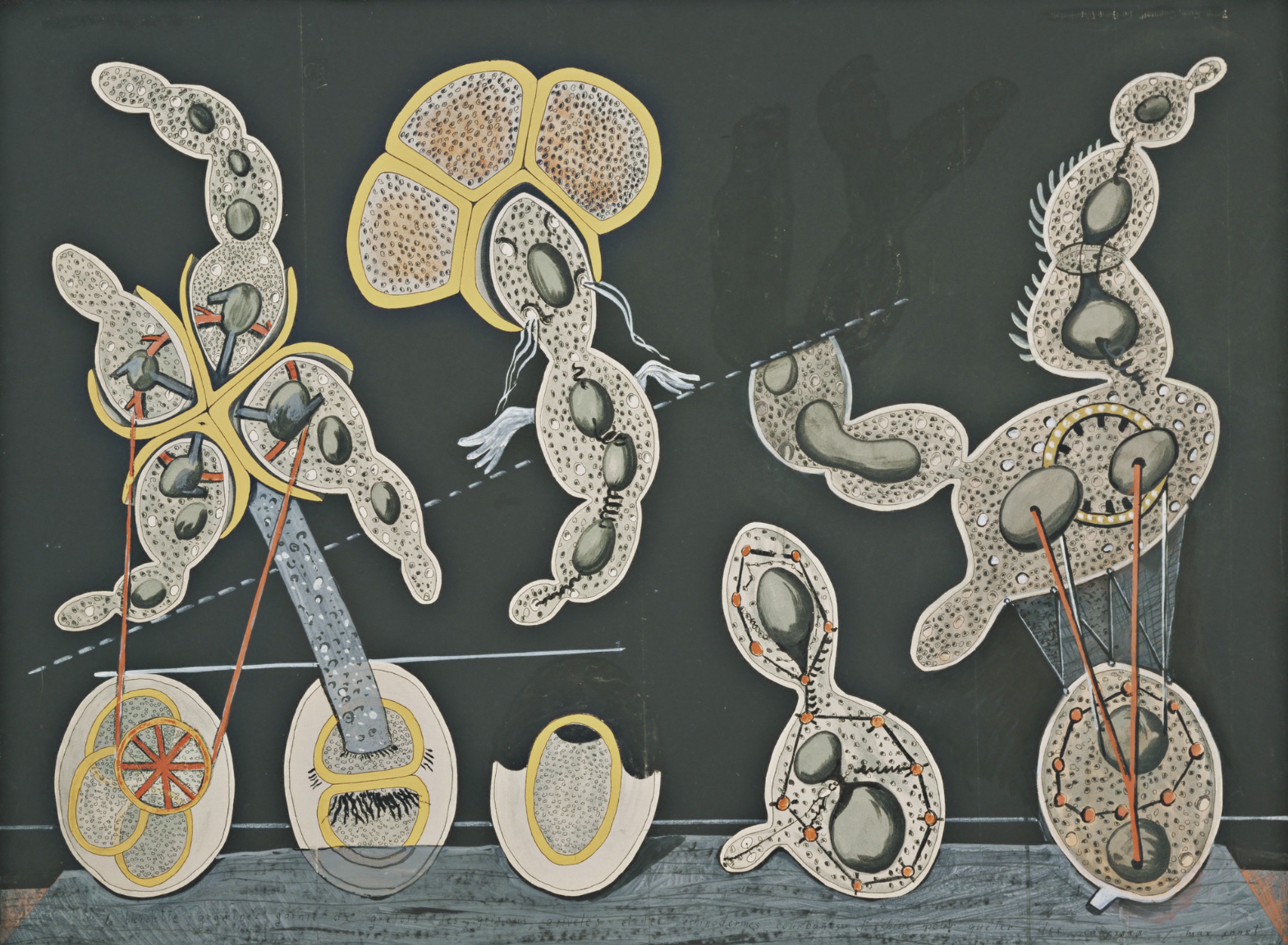Open Access
Is the Bill and Melinda Gates Foundation’s new OA policy the start of a shift towards preprints?
Following the announcement of the Bill and Melinda Gates Foundation’s new open access policy, Richard Sever assesses whether this change signals the beginning of a wider preprint-led open access transition. The Bill and Melinda Gates Foundation (the second largest charitable foundation in the world) recently announced a new open access (OA) policy. They will require … Continued
The Challenges of a Large Interdisciplinary Project (guest post)
Over the past decade or so we’ve seen philosophers win sizable grants for projects involving multiple teams of researchers with different disciplinary and institutional homes.
What are some of the challenges involved in keeping such a project going, and how might they be addressed?
In the following guest post, Keely Khoury and Peter J. Hundt, both at the University of Minnesota and both part of the support staff for philosopher Alan C. Love‘s big “Agency, Directionality, and Function: Foundations for a Science of Purpose” project, discuss some of these challenges, focusing on publishing—especially open access publishing.

[Max Ernst, “The Gramineous Bicycle Garnished with Bells, the Dappled Fire Damps, and the Echinoderms Bending the Spine to Look for Caresses”
The Challenges of Publishing Open Access Work from an Interdisciplinary Research Project
by Keely Khoury and Peter J. Hundt
About the Project
The “Agency, Directionality, and Function” project, led by Alan C. Love, brings together 130 researchers from 50 different institutions, divided into 24 teams, with the teams grouped into seven clusters, each with a slightly different angle of inquiry into one of the project’s three conceptual themes: agency, directionality, and biological function.
With its large size and complex structure, the project faces various challenges on the way to its goal of “advancing fundamental theoretical and philosophical concepts for goal-directed phenomena with the specific aim of operationalizing them for theoretical and empirical inquiry.”
Commitment to Open Access
The project also aims to “foster new lines of scientific research based on an increased array of conceptual possibilities, distinctive formal modeling strategies, and next-generation experimental platforms for the discovery, observation, and manipulation of purposive phenomena” in biology and beyond.
To do this, the project was committed to making all publications, whether conceptual, theoretical, or empirical, freely accessible. That commitment extends to research materials that include protocols for experimental platforms, software code for computational modeling, and mathematical proofs for formal models. Given that project participants have expertise in fields that range from cancer research and evolutionary and developmental biology to paleontology, ecology, computer science, philosophy and more, the details of this commitment are complicated (to put it mildly).
The idea is great. Accomplishing it is the challenge.
Challenges
The size of this cohort program allowed us to observe and support the publishing process for team members in a range of fields, in several nations, and at varying stages in their academic careers. The project budget included money explicitly for paying Open Access fees and for support staff to help connect and guide teams through structured interdisciplinary interactions.
Starting from this relatively privileged position did not, however, simplify significantly the processes required to publish work open access.
The hurdles we experienced were related to several sources: a feeling of ambivalence towards publishing work open access because of the high cost; the variety of complexities of processes between titles and fields of study; and the efficiency and efficacy of tracking outputs, particularly as articles moved from pre-print to final versions.
Knowledge of the Process
From the start, there were differing levels of awareness of open access publishing across the disciplines represented by the scholars in the cohort program. Many of the scientists had at least some experience with or knowledge of what was involved in publishing their work open access, with a few contributing to upwards of 25 papers that were made freely available in the two years preceding the start of this project.
Scholars in the humanities were less likely to have had similar experiences. An interim review of the papers published open access by members of the cohort program found that more than one-third came from only two areas of science, with the arts and humanities and social sciences each comprising roughly five per cent of the number of publications. The speed at which publishing in the various fields occurs is part of this difference, but not all of it.
Part of what makes this project special is the funding dedicated to publishing open access. Both the central project management team and each of the 24 teams comprising the cohort program were granted funds specifically for this. That is a rarity. To help make best use of these dedicated funds, we ran an internal information campaign, and dedicated a staff member to shepherding teams towards and through open access publishing.
A resource that we discovered to be incredibly helpful in our work navigating different systems and tracking outputs is institutional librarians. Likely a vastly underutilized source of knowledge, the librarians we worked with readily shared their expertise gained through their experience of working with publishers and publishing processes.
One of the tips they shared with us is to have authors retain the copyright to their work as a way of publishing open access after initial publication in a journal. Of the scholars we spoke to in the cohort program, some didn’t know about this option or, if they did, thought it was too time-intensive to be useful.
Having institutional templates for negotiating this type of ownership would go a long way towards reducing the burden on individual scholars. Educating graduate students in the publishing process, with particulars for their field of study, would also strengthen their ability to contribute meaningfully and purposefully to the accessible dissemination of their work.
Cost and Time Challenges
Even when researchers are convinced of the importance of publishing open access, the current systems are not easily understood or traversed. For one of our program’s open access publishing projects, legal hurdles proved to be particularly time-consuming.
A book edited by a cohort program participant, and containing chapters written by others in the program, was nearing completion when we sent the first query about publishing it open access. Because the editor already had a contract in place with the publisher, the termination of the original contract, and writing of a new one, took almost nine months to complete. That followed many months of back-and-forth communication regarding the general feasibility of, and financial responsibility for, publishing an entire book this way.
Ultimately, it took 19 months to publish the book open access and was only possible because of the funds the program had already ringfenced for this type of publishing. For authors without such explicit financial means and institutional support, the time it took to publish the work in this way would most likely be considered not worth the expenditure and certainly unattainable economically.
Tracking Outputs
Tracking the publications of the teams and their members has proven to be one of the more complex and time-consuming tasks of the program, with much of the work requiring regular manual checks. The proliferation of online search tools and storage programs meant a lot of trial and error in our efforts to find a combination of systems that most accurately tracked publications from project participants. The diversity of fields encompassed by these teams, and sheer number of researchers involved, made the undertaking particularly complicated and involved weekly checks of at least six preprint servers. Now, thankfully, that task has become easier thanks to Scopus’ preprints search tool that collates data into a single space. We also set up at least one digital search alert for each of the 130 scholars. This entails a continual sifting of results to weed out oddities that the algorithm searches present to us.
Ensuring that our project-wide bibliography does not include predatory journals adds a further layer of manual labor to the process. Disagreement over the categorization of certain journal titles necessitates an element of subjectivity in what to include or exclude in our record keeping.
As well as publishing written papers, part of the project’s pursuit of open science includes sharing de-identified data and research materials in a publicly accessible repository. The purpose is to make it possible for an independent researcher to reproduce the reported results. This is an area of work within the project that is still in progress as we consider ways in which to record most efficiently the existence of these datasets and note to which project they relate.
Interactions and Reproducibility
As an attempt to cultivate a new type of research community, the mix of philosophers, theoreticians, and experimentalists that comprise the members of this cohort program are scholars at different stages in their careers. That, along with the organization of opportunities for interaction, discussion and feedback across disciplines, provides participants with an interactive peek into areas of research that many would otherwise not have the time or chance to access.
Another way this project attempts to stimulate scholarly change through thematic working across disciplines is to provide participants with a monthly list of publications by members of the cohort program. That list allows researchers to scan titles of work and dip in and out of a mix of ideas that otherwise would most likely be unfound amidst the general, and growing, deluge of academic publishing and data production. Organizing opportunities for serendipitous connections sounds counterintuitive, but reducing the strain on a scholar’s time makes it easier for them to identify relevant, interesting and inspirational work by others, in their own field and beyond.
Lastly, without the project’s funding dedicated to open access publishing, the relatively high number of papers from cohort program participants published in this way would no doubt have been less. The elaborate heterogeneity we encountered throughout the academic publishing industry as we developed processes to encourage, support and track open access publication makes the record of this work an important foundation for future development and improvements, within publishing and interdisciplinary research projects. The program’s attempt to build common vocabularies for data, models and concepts and establish reporting standards further cultivates the reproducibility of large-scale interdisciplinary work formats.
The post The Challenges of a Large Interdisciplinary Project (guest post) first appeared on Daily Nous.
Dialectica and the Challenges of Converting a Journal to Open Access
A reader recently pointed out that the philosophy journal Dialectica in 2020 became an open access journal, after 15 years of being published by Blackwell-Wiley, but that the journal’s latest issue was dated 2020. What’s going on at this journal?

A lot, it turns out.
I asked the journal’s editor, Philipp Blum (Lucerne), for an explanation, which he provides below. As you’ll see, the conversion of a journal to open access can be difficult. Dr. Blum describes some of the various challenges involved, and the work that he and his fellow editors have been doing over the past few years.
The light at the end of the tunnel is this: over the next two months, Dialetica will be publishing 12 issues, catching the journal up to the end of 2023, with plans to publish the first 2024 issue by the end of April.
Here is Dr. Blum’s account:
The Editorial Board of Dialectica, the Swiss philosophy journal founded in 1947 by Bernays, Gonseth and Bachelard, decided in 2019 to go real (so-called “Platinum” or “Diamond”) Open Access, increasingly dissatisfied with the combination of poorer service and higher costs provided by our former publisher Blackwell (bought by Wiley in 2007) and convinced that universities should not have to pay for the fruits of the work of their employees. Helped by a grant by the Swiss National Science Foundation for the year 2020, we founded the Dialectica Open Access Initiative to develop a workflow, based on Markdown and MacFarlane’s pandoc, turning final manuscripts into aesthetically pleasing pdfs and smartphone readable htmls.
Unfortunately, this took us a really long time. In retrospect, it would have been better to cancel our publication contract with Wiley at the end, rather than at the beginning of the flipping process. Using only freely available software, we had to develop a number of tools, for example environments for principles and statements common in philosophy papers, which we make freely available on our GitHub “DialOA” page. In the context of this second project, funded by swissuniversities, we also started working on an OA toolkit, to lay out the choice-points and difficulties we faced, in the hope of helping other philosophy journals to go OA – which, for us, means getting rid of commercial publishers altogether. We also started making publicly available the huge bibliography we use for the copy-editing of Dialectica articles, which may, perhaps, one day complement PhilPapers and CrossRef.
During this time, we maintained our ordinary procedures: good papers kept being sent in, the Editorial Committee met every week to discuss them, using the “fishpond”, our system for triple-blind refereeing. With the indispensable help of my co-editor, Fabrice Correia of the University of Geneva, we accepted original papers of the highest quality for all the Dialectica issues up to 76(4), the autumn issue of 2023, all of which are now being copy-edited and will soon be made freely available to everyone.
To those with papers to submit, he adds:
Now is the perfect time to submit your paper to Dialectica: we are able to speedily review them and there are still open slots in 77(1), to be published in April.
And to the philosophical community, he says:
Any advice, especially on copy-editing and collaborative proof-correction, as well as new members for the Editorial Committee are most welcome! Please write to dialectica@philosophie.ch.
Dialectica bills itself as a “general analytic philosophy journal”. It is the official organ of the European Society of Analytic Philosophy. You can learn more about it here.
The post Dialectica and the Challenges of Converting a Journal to Open Access first appeared on Daily Nous.
Philosophers, Should You Pay to Publish Your Paper? (guest post)
“In a survey of 27 philosophy of science journal editors we conducted in 2023, many, if not most of them, did not know that they were working in a transformative journal.” A what now?
The landscape of academic publishing is changing. In the following guest post, Sophia Crüwell (Cambridge), Chiara Lisciandra (Groningen), and David Teira (UNED) talk about the push towards Open Access, its effects, and ways it can go better and worse.

Philosophers, Should you Pay to Publish your Paper?
by Sophia Crüwell, Chiara Lisciandra, David Teira
If you have recently had a manuscript accepted by a journal published by one of the traditional subscription-focused publishers (e.g., Springer), you may have noticed a not-so-subtle change in the publication options. As part of your publishing agreement, the interface may nudge you to pay an Author Publication Charge (APC) to publish your paper Open Access. The traditional publish-for-free, behind a paywall, tick appears only in a smaller typeset link somewhere at the bottom of the screen. Why is this happening?
In November 2022, under the auspices of three major international societies in the philosophy of science, we started an inquiry to understand how we ended up here. Back then, research institutions and funding agencies on both sides of the Atlantic had decided that their scientific output should be Open Access (OA): free for everyone to read after publication. (Great! Or so it seems.) To make this happen, funding bodies and other institutions signed Transformative Agreements with publishers, paying for thousands of APCs in advance so (a) their affiliated authors could publish OA at no cost for them; and (b) journals would transition to a Gold Open Access regime, in which APCs, instead of subscriptions, would cover the journal costs.
The drawback: once the transition was completed, authors without the necessary funds may not be able to publish in the leading journals in their fields.
For the funding bodies, as Paola Galimberti explains here, transformative agreements were supposedly temporary and cost-neutral: the money previously spent in subscriptions would be invested in APCs, making research accessible to everybody. But the publishing world is changing: in 2018, 4,18 million articles were published; in 2022, the figure rose to 5,14 million. Many of these were in journals put out by new aggressive publishing houses, like MDPI and Frontiers, in which quantity often trumps quality, because their business model relies entirely on APCs: the more papers they publish, the bigger the earnings.
Recent scandals (about flawed refereeing) have shown the limitations of this approach. For traditional subscription-focussed publishers—as Ties Nijssen from Springer told us in our first panel session in Belgrade—transformative agreements were a strategy to preserve the quality and diversity of their journal portfolio. For example, Frontiers has just one big journal per field, whereas traditional subscription publishers often have many journals that specialize publishing research for a specialized community. The challenge for them was not to make the same mistakes as their new peers and risk becoming seen as predatory. There are already signs that it is not going to be easy.
In the summer of 2023, transformative agreements had their first reality check, as Sabina Leonellli laid it out for us (also in Belgrade). Very few journals had transitioned to a Gold Open Access regime: despite the subsidized APCs, most authors were still choosing to publish for free behind a paywall. This is not necessarily unreasonable: a study by Brad Wray shows that, for most papers, citations tend to be similar whether they are OA or not. cOAlition S, an alliance of EU funding bodies, decided they would not be paying subscription fees and APCs. Traditional publishers decided they would carry on with transformative journals, otherwise they would not be able to resist the competition of the more profitable ventures such as Frontiers and MDPI. This is why you, author, are finding a new interface nudging you to pay in journals where you did not expect it.
Why should this concern you?
It is already happening: Cambridge University Press is moving its leading philosophy journals to a Gold OA regime (see Episteme, here). They promise that if you do not have funds to pay APCs, there will be waivers. While this is generous, it is not guaranteed, and other publishers may not be so generous.
Many scholarly societies pay their expenses (for, e.g., conferences) through the journals they own. Publishers shared with them, as royalties, part of the money they earned via subscriptions. Now, with APCs, it remains to be seen how many journals will survive and how much money they generate for redistribution. Jim Weatherall, editor of a Cambridge journal, Philosophy of Science, explained that their current agreement between Cambridge and the PSA runs for another three years.
Meanwhile, few are noticing: in a survey of 27 philosophy of science journal editors we conducted in 2023, many, if not most of them, did not know that they were working in a transformative journal, evolving into a Gold OA regime. Publishers are seemingly not involving the key stakeholders in this conversation.
Your next question would be, we guess, what should you do about it?
If you are involved in a scholarly society, perhaps you could start a discussion about how central journals are to its mission. For instance, in response to the merger of Studies B with two other Elsevier journals, philosophers of physics have created a society that is entirely devoted to fund a new Diamond Open Access journal, Philosophy of Physics (see its editor, David Wallace, explaining it here)
In your department, you may consider supporting repositories compliant with OA principles, like Philpapers or the Phil-Sci Archive. Forget, please, about Researchgate or Academia.edu: they are for profit. Small scholarly communities like philosophy need to consolidate their own OA institutions to have an alternative if the Gold OA regime comes to prevail.
Let us find better incentives for the people bearing the hidden costs of journal publication, namely editors and reviewers. These are volunteers donating their time with no significant compensation from the publishers. Alex Levine calculated that the time he spent over the decade he edited Perspectives on Science costs $50,000 at his salary rate. That extra million papers published between 2018 and 2022 would only increase the editorial burdens, and few volunteers had an incentive to shoulder more of it. Without, e.g., teaching load reductions, extra points for service in promotion evaluation, etc., we cannot expect non-profit OA institutions to survive.
As of now, this is how the situation looks for us. We will keep reporting.
The post Philosophers, Should You Pay to Publish Your Paper? (guest post) first appeared on Daily Nous.
Open access works – 420 million citations show OA outputs are cited by more researchers from more places
Open access is built on the promise that more people are able to access and use research. Putting this to the test, Chun-Kai (Karl) Huang, Cameron Neylon and Lucy Montgomery explore where citations come from for 19 million research outputs and find that open access is indeed working as it is meant to – allowing … Continued
Open Access Journals in Philosophy
How many open access philosophy journals are there? Take a guess.
What did you guess?

OK…
Here’s how many open access journals there are: it depends, but probably more than you thought.
According to the Directory of Open Access Journals (DOAJ), there are 293.
But we can filter the answers a bit more, and include only open access philosophy journals that make use of double-anonymous peer-review. The number is then 228.
We can narrow things down a bit more to include only journals that include English among the languages they accept submissions in. That takes us down to 178.
We can also filter out journals that charge fees. That brings the number to 170. You can browse through that list here, and play around with the filters.
If you’re involved with an open access philosophy journal that’s not included in the directory, you can submit an application here.
The post Open Access Journals in Philosophy first appeared on Daily Nous.
Not-for-profit scholarly publishing might not be cheaper – And that’s OK
The rising cost of academic publishing is causing consternation across the research ecosystem and prompting calls in Europe for a transition to not-for-profit publishing models. Rob Johnson argues that expecting emerging not-for-profit providers to offer a cheaper solution than commercial players is a surefire way to keep them small – or make them fail. In … Continued
2023 in Review – The culture of academic publishing
2023 has been a year of settling norms in open access publishing and a gradual shift in focus from the paradigm of open access to one of open research more broadly. As ever, this has resulted in wide-ranging debates around what form academic publications should take and what kind of institutions and social organisations that … Continued
The Future of Philosophy Journals
“What is the future of philosophy journals?”

That’s the question at the heart of an upcoming open online event taking place on Wednesday, January 17th.
“The Future of Transformative Journals in Philosophy” is organized by the Open Access working group—Sophia Crüwell (Cambridge), Chiara Lisciandra (Utrecht), and David Teira (UNED). They write:
Many publishers (like Springer or Elsevier) have declared their journals “transformative”, hoping to transition to a Gold Open Access regime, in which all papers will be freely accessible, since their authors will have covered the costs with an Author Processing Charge. But while opening access to scientific publications enables a wider circulation of scientific work, this might come at the cost of hindering access to scientific contributions from authors, institutions, or countries with limited funding opportunities. European funding bodies, like the Coalition S, are now surveying the scientific community to grasp its views on this process.
The 90 minute session will have a quick introductory overview of the situation, delivered by an expert librarian, followed by a panel discussion with four journal editors and an open debate with the participants. Throughout the discussion, we will reflect on the steps to take in response to current challenges, our options as editors, and prospects for developing alternative publishing models. Overall, the session will provide a critical examination of the evolving landscape of academic publishing in philosophy.
More information and registration are here.
The post The Future of Philosophy Journals first appeared on Daily Nous.
Elsevier’s Mendeley Creates Open Data Research Resources
Scholarly open science has long been practiced effectively by SSRN and thereof our mantra: “making early-stage research available helping researchers create better research, faster”. It’s only natural SSRN’s sister company, Mendeley Data adds curated content by creating ongoing collections available in a one-stop repository for researchers to discover.
All for free.
If you are looking for specific data resources to continue your research, Elsevier has created collections available to freely view and download:
Explore and download the research you want, when you want it.
- Elsevier OA CC-BY Corpus
- ChEMU dataset for information extraction from chemical patents
- The researcher journey through a gender lens
- Data for: Build it and they will come:
The convening power of the SOLEIL Synchrotron facility - Covid-19 Relevancy Algorithm Data Set for Identification of Core Scientific Articles
- Analysis of research data for 11 Institutions – Data Monitor
- Protein regulatory relationships in COVID19
- 3D reconstruction data used to perform selection task
- Media and Cell Line Dictionaries
- Data for: Accept me, accept me not:
What do journal acceptance rates really mean? - … and many more
These collections are curated to keep you informed of the latest research in these most popular fields of study.
Here are just some of the benefits of open research data for authors and readers:
Authors
- Get credit for all your research outputs, not just the paper
- Potentially attract more citations
- Comply with funder mandates data sharing
- Start sharing your datasets
Readers
- Easily access the data which underpins a paper
- Facilitates evaluating and attempting to reproduce the paper’s findings
- Use the data in your own research and meta-studies
Your data is FAIR with Mendeley Data
- When collaborating with the research community to develop Mendeley Data, we followed the FAIR data principles to increase the exposure of research data.
Data Defined
When we talk about data, we mean all forms of research data inclusive of everything needed to reproduce the research. So, raw data, processed data, protocols, methods, workflows, machine & environment settings, scripts, analyses, algorithms, and a plethora of other types of analysis tools.
Benefits within an Open-Access Culture
Reusing research data improves the research data life-cycles with the lab and to the world-wide researcher audience.
In turn, researchers benefit with time savings when searching, collecting, and sharing data by using the Mendeley Data datasets and SSRN tools to disseminate their early-stage discoveries. There’s compliance with funders’ mandates and improved impact to increase data reuse.
Start discovering new datasets on Mendeley Data, today!
Interested in adding your work to SSRN? Set up your free account, today.
Are you a research leader interested in achieving more visibility for your research output? A Research Paper Series could be your answer. Let us provide a 30-minute complimentary demo of the online tools to support your faculty and students to showcase research.



